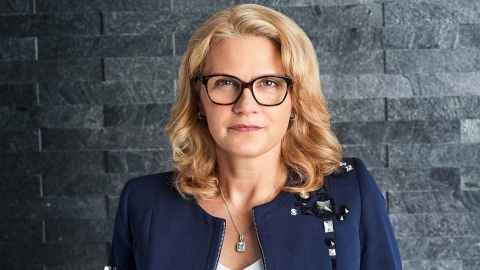Dame Helen Winkelmann: Chief Justice for all
31 May 2019
New Zealand's new Chief Justice is drawing attention to diversity issues.

When Dame Helen Winkelmann was sworn in as the 13th Chief Justice of New Zealand on 14 March, she became not only the second woman in the role, but the second alumna from the University of Auckland. Her predecessor, Dame Sian Elias (BA/LLB 1971, LLD 1999), held the position for 20 years until 13 March, retiring at the compulsory age of 70.
Dame Helen (LLB 1987) says Dame Sian had been a mentor and that having women in positions of significance is aspirational for young women. "It's important because it's encouraging to see someone a little like you in the role. When I was going through Law School, women didn't have that encouragement, because at that time judges were all grey-haired men.
"Mentoring, as we know it today, wasn't available at Law School either, certainly not as far as women mentors went. But people who sparked and maintained my interest in the law were Professor Mike Taggart, who died prematurely in 2009, Professor Francis Dawson, who still works at the University of Auckland, and Professor David Williams, just retired."
The judiciary needs diversity of thought and you achieve that by having people from diverse backgrounds.
Dame Helen says some issues of gender equity have been addressed in the judiciary by the efforts of successive attorneys-general, but equally important is the issue of diversity in the profession, which requires urgent discussion.
"The judiciary needs diversity of thought and you achieve that by having people from diverse backgrounds. But the judiciary draws its appointments from the profession and our profession currently lacks diversity in background. I see this as an urgent issue for our profession and our law schools.
"Law schools need to revisit their methods of assessing merit and entry into law – we're not giving young people from disadvantaged backgrounds enough time to show excellence."
Another issue she's committed to improving is fair access to legal representation. Many assume the legal aid system gives everyone access to a lawyer if needed. But the maximum you can earn to be eligible for legal aid, if you are single with no dependants, is just under $24,000. The maximum income varies depending on the number of dependants.
"That leaves many people unable to afford legal representation. Lawyers are expensive. As part of my role, I think it's important to promote discussion regarding how important it is that all have the opportunity to have legal representation if they must go before the courts".
The Ministry of Justice has been carrying out a review of the legal aid system, which includes consideration of increasing the legal aid threshold. The answer doesn't lie only with legal aid, however. Dame Helen says the legal profession itself needs to address how it can provide representation at lower cost.
Dame Helen's role as Chief Justice places her at the top of the pyramid of judges in New Zealand. She's also the first "pure" appointment as a Chief Justice because since the last one was appointed, reforms occurred that put the leader of judges in the Supreme Court rather than the High Court.
She says the day of the ceremony was special. "The ceremonial aspect brings home to the judge the significance of the role and of the oath they take," she says. "It also marks the importance the role has to society."
But the moment disappeared from the headlines quickly because the very next day was the Christchurch terror attacks. "This is a hard time for New Zealand. At such times, the public institutions, including the courts, must step up and perform their work in an exemplary fashion."
In her role, she is expected to be a thought leader as well as leader of the judiciary. "I hope to be an inclusive leader and I will work to share a vision of a fair, accessible and humane system of justice."
The Auckland Law School is planning to establish a women's mentoring programme for Auckland law students. To find out how you can become involved in the programme, email: catherine.davies@auckland.ac.nz